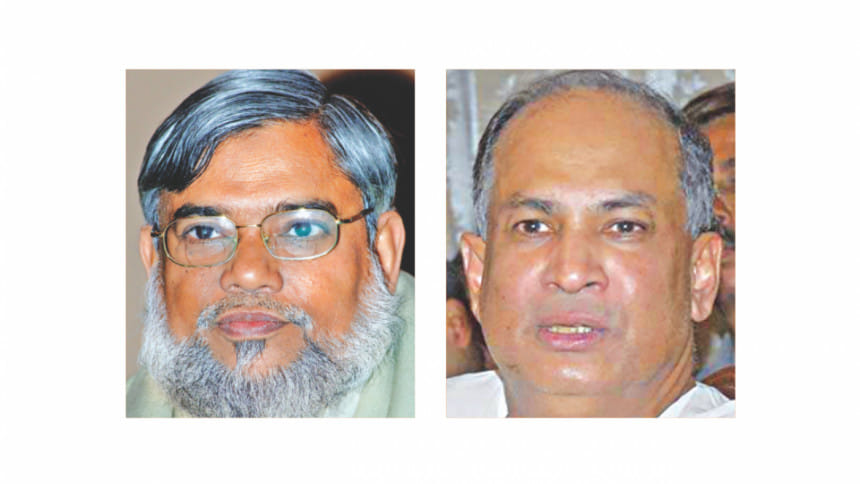Wait now is for SC review

The Supreme Court yesterday released its full verdicts that upheld the death penalty of Ali Ahsan Mohammad Mojaheed and Salauddin Quader Chowdhury for 1971 war crimes, leaving them with the option of seeking review of the verdicts.
Attorney General Mahbubey Alam told The Daily Star that Jamaat-e-Islami leader Mojaheed and BNP leader Salauddin could file review petitions with the SC within 15 days of getting copies of the full verdicts.
Asked, Khandker Mahbub Hossain, principal counsel for both Mojaheed and Salauddin, said his clients would seek review within the deadline.
He said they would first go through the full verdicts and then determine the grounds for seeking review.
In two judgments in June and July this year, the SC affirmed the death penalty of Mojaheed and Salauddin after hearing their appeals against the verdicts of two international crimes tribunals that awarded them capital punishment around two years ago for committing crimes against humanity.
According to Mahbub, the SC is likely to hear the review petitions after it reopens on November 1, as there is no urgency to hear those during the vacation.
The attorney general, however, said there was urgency to hear such petitions, and the apex court could hold the hearing during vacation if it wishes.
The SC went on a 44-day annual vacation on September 18 and will reopen on November 1.
Meanwhile, the SC sent copies of the full judgments to the International Crimes Tribunal (ICT).
Contacted, Shahidul Alam Jhinuk, registrar of the tribunal, said his office received copies of the verdicts around 7:30pm yesterday.
He said they would submit today the copies to the tribunal, which is expected to issue warrants of execution.
Once issued, the warrants would be sent to the jail authorities, district magistrates concerned, and both home and law ministries, added Shahidul.
Sixty-seven-year-old Mojaheed is now in Dhaka Central Jail while sixty-six-year-old Salauddin is in Kashimpur Jail-1.
The attorney general said the jail authorities could start the process of executing Mojaheed and Salauddin after getting copies of the full judgments.
If the convicts file review petitions, the process would automatically come to a halt and remain so until the SC disposes of the petitions, he said.
Through the petitions, the two war crimes convicts could pray to the apex court to examine whether there was any error in the judgments on their appeals.
If the review petitions are rejected, the last option for the two will be to seek presidential mercy.
Usually, a review petition is entertained in case of serious factual mistakes in the verdict or wrongful application of the law in punishing the accused.
A death sentence cannot be executed while a review or clemency petition is pending, according to an earlier SC order on Abdul Quader Mollah's review petition.
In that order, the top court said review petitions should be disposed of on a priority basis.
The war crimes accused are tried under International Crimes Tribunal Act 1973. Since this law has no provision for filing review petitions, the SC exercised its inherent power to reach the decision on Mollah's petition to allow both the defence and the prosecution to seek a review.
Jamaat leader Quader Mollah was executed on December 12, 2012, for war crimes committed in 1971.
OBSERVATIONS
In the 191-page verdict on Mojaheed's appeal, the highest court referred to the intellectual killings, and said: "The aforesaid wholesale atrocities had been committed by the members of Badr Bahini as were committed by the members of the SS, the SD and the Gestapo Bahinies during Second World War.
"The pattern of the killings and of the circumstances under which those took place bring to mind the bitter memory of the Hitlerite hordes' onslaughts on culture. It was the cruellest blow to all the Bangalees.
"It was cold blooded savagery. Such barbaric, gruesome and brutal crime which the Badr Bahini committed at the instigation of the appellant [Mojaheed] is comparable with Hitler's gas chamber genocide. The entire world witnessed such genocide and brutality committed by Al- Badr Bahini … Definitely he [Mojaheed] was a war criminal."
In its 217-page judgment on Salauddin's appeal, the SC observed that he had "committed crimes with highest ruthlessness and extreme atrocity".
"He persecuted civilian and unarmed people, tortured them to death, caused disappearance of innocent people and helped in disappearing people in collaboration with the occupier Pakistani Army."
The SC said the prosecution was able to establish clearly that Salauddin had thoroughly designed plans and common objectives to commit those crimes. He had done all those brutal offences with specific intention to exterminate the Hindu community and his political opponents from that locality.
CASE BACKGROUND
On June 16 this year, a four-member SC bench headed by Chief Justice Surendra Kumar Sinha unanimously upheld the death penalty of Mojaheed for planning and instigating the killing of intellectuals and professionals at the fag end of the Liberation War.
It was the first time that an ex-minister was sentenced to death for war crimes. Mojaheed is also the first war crimes convict facing death for the killing of intellectuals and professionals.
In 1971, the Jamaat secretary general was chief of the infamous Al-Badr Bahini, an auxiliary force of Pakistan army, responsible for abducting, torturing and killing freedom fighters, intellectuals and pro-liberation people.
The SC upheld his life sentence, handed down by the ICT-2 on July 17, 2013, for killing composer Altaf Mahmud, Jahir Uddin Jalal, Badi, Rumi (son of Shaheed Janani Jahanara Imam), Jewel and Azad at the Old MP Hostel at Nakhalpara in Dhaka.
The highest court also affirmed his five years' jail term for confining and torturing Ranjit Nath, a civilian, at a Bihari camp in Faridpur.
Mojaheed, who was a technocrat minister during the BNP-Jamaat alliance rule in 2001-2006, came under harsh criticism for his audacious comment in 2007 that there were no war criminals in the country.
Also an accused in the August-21 grenade attack case, he was arrested in June 2010 in a case filed for hurting religious sentiments. He was shown arrested in a war crimes case in August the same year.
On July 29 this year, the SC bench led by SK Sinha upheld the death penalty of ex-BNP lawmaker Salauddin for the brutal killing of Natun Chandra Sinha, Awami League leader Mozaffar Ahmed and his son; and two acts of genocide in Sultanpur Banikpara and Unasattarpara villages in Raozan where 74 villagers were massacred.
It also upheld his 20 years' jail sentence, handed down by the ICT-1 on October 1, 2013, on two charges: acts of genocide at Maddhya Gohira Hindupara and at Jagotmallopara in Raozan. At least 37 people were killed in the two villages.
The SC also affirmed the tribunal's verdict that sentenced him to five years' imprisonment on each of two charges of abducting, confining and torturing Saleh Uddin, who later became vice chancellor of Shahjalal University of Science and Technology, and Nizamuddin Ahmed, who later became a journalist.
Meanwhile, Bangladesh Jamaat-e-Islami yesterday claimed that its Secretary General Mojaheed has been a victim of the government's conspiracy to make the party leaderless.
In a statement, Jamaat acting ameer Mokbul Ahmad demanded the release of Mojaheed and other detained Jamaat leaders.

 For all latest news, follow The Daily Star's Google News channel.
For all latest news, follow The Daily Star's Google News channel. 



Comments